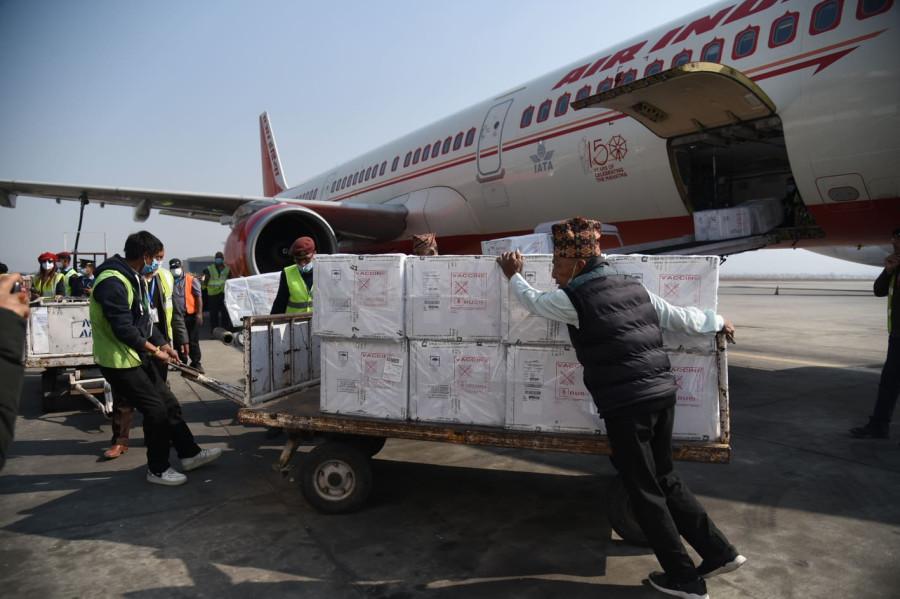Health
Government seeks another 5 million doses of Covishield from India vaccine maker
Identifying the virus variants spreading in the country is equally important to contain the infections, health experts say.
Arjun Poudel
The government has requested the Serum Institute of India to sell an additional five million doses of its Covishield vaccine to Nepal.
The five million doses are required to administer a second dose to those receiving the first dose of vaccine, officials at the Ministry of Health and Population say.
“We are awaiting response from the Serum Institute of India to our proposal,” Dr Roshan Pokhrel, chief specialist at the Health Ministry, told the Post.
The serum Institute of India produces Covishield vaccine, developed by the University of Oxford and AstraZeneca, the British-Swedish multinational pharmaceutical and biopharmaceutical company. Covishield is the preferred choice of Nepali authorities, as the country’s existing system supports storage and supply of the vaccine.
The government has already purchased two million shots of Covishield vaccine at $4 per dose from the Serum Institute of India, paying 80 percent of the total amount in advance. The company has already supplied one million doses and officials say another million doses will arrive within a week.
The government started the first phase of immunisation on January 27 with the one million doses provided by India in grant. According to the Child Health Section of the Family Welfare Division under the Department of Health services, 429,705 people took the jab in the campaign, meeting 85.65 percent of the target.
So far, 1.4 percent of the total population has received the first dose of vaccine.
Meanwhile, public health experts say that identifying virus variants spreading in the country is equally important to lessen the risk of new waves of contagion.
“We need to know the virus variant, whether or not the vaccine is working,” Dr Anup Subedee, an infectious disease expert, told the Post. “To contain the spread of infections and to know if the vaccines are working, it is important to know the virus variant.”
Several new variants of the coronavirus have been spreading in countries across the globe. Some of them are the UK variant, the South African variant and the Brazilian and Japanese variants.
After a consistent decline in new cases in India, numbers have picked up in at least four states again due to new variants of the virus. According to the Times of India, the number of coronavirus cases is surging, particularly in Punjab, Maharashtra, Kerala and Madhya Pradesh.
At least two new coronavirus variants—N440K and E48K—are spreading faster in some states, according to timesnownews.com.
Nepal too had recorded three cases of a new variant of the coronavirus, the one identified in the United Kingdom in December.
“We don’t know if the UK variant of the virus was present only in the three people or is spreading in society,” said Subedee. “New variants of the virus can develop within the country also and the vaccine being used may not work on them.”
The Epidemiology and Disease Control Division said that at least 13 suspected cases of the new variant have been found in Kathmandu and Pokhara. Samples of those people, who came in close contact with the people returning from abroad, were found positive in the polymerase chain reaction tests but negative for s-gene targets.
S-gene target or spike protein is one of the key biological characteristics of SARS-CoV-2, which enables the virus to penetrate host cells and cause infections.
Without spike protein, the coronavirus cannot infect people but doctors say that if the polymerase chain reaction tests are failing to detect the spike proteins in the swab samples of the infected people or negative s-gene target, there is a possibility that the virus may have undergone mutations or the virus could be of a different variant than the one commonly found in the country.
S-gene target or spike protein is one of the key biological characteristics of SARS-CoV-2, which enables the virus to penetrate host cells and cause infections.
Without spike protein, the coronavirus cannot infect people but doctors say if the polymerase chain reaction tests are failing to detect the spike proteins in the swab samples of the infected people or negative s-gene target, there is a possibility that the virus may have undergone mutations or the virus could be of a different variant than the one common in the country.
“We need to conduct whole-genome sequencing on a regular basis,” Dr Prabhat Adhikari, an infectious disease and critical care expert, told the Post. “It will be costly for the country if we only focus on the vaccine and forget the risks.”
According to Adhikari, even if the state-run laboratories do not have the capacity to perform gene sequencing, authorities should use the capacity of the private sector.
Along with studying the gene of the virus, authorities should also enforce safety measures, which is still effective in lessening the spread of infections.
Meanwhile, the Health Ministry on Wednesday said that deaths of an additional 619 people were responsible for Covid-19 infection. With this, death toll from the coronavirus infection in the country has reached 2,684.
“We found that data of people who died at home due to coronavirus infection were not included in the ministry’s record but were recorded in the Covid-19 Crisis Management Center’s system,” Dr Jageshwor Gautam, spokesperson for the Health Ministry, told the Post. “We have formed a committee to study the differences in the data and have adjusted it as suggested by the committee.”
Those people died before November at their homes, whose bodies were managed by the Army, according to Gautam.




 21.82°C Kathmandu
21.82°C Kathmandu















